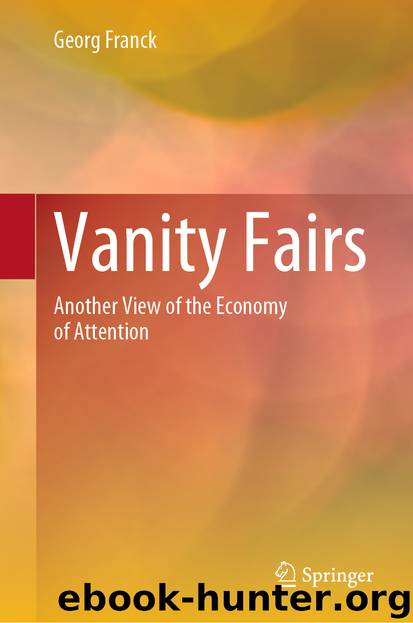Vanity Fairs by Georg Franck

Author:Georg Franck
Language: eng
Format: epub
ISBN: 9783030415327
Publisher: Springer International Publishing
Material and Mental Second-Order Capitalism
By leaving behind the exchange of information for money, the new media perform a decoupling from the “real” base of the economy strikingly analogous to the one performed by finance in money economy when developing into what came to be called the financial industries . Financial industries do not sell credits to borrowers to be turned into real investment , but only package credits given to derivative capital that entitles subscription for profits . Trading with derivatives has proved much more profitable than the retail trade of loans. By the same token, the new media do not sell the information to the consumers demanding it, but package the attractive force of the information disseminated into the derivative form of a marketable service. Again, trading with the derivative has proved much more profitable than the retail trade of information. In both cases, we are dealing with a second-order kind of capitalism ushered in by deregulation .
Deregulation lies at the base of the transformation of classical finance into the neophyte financial industries . Traditionally, client-based deposit banking was clearly separated, both by written and unwritten law, from transaction-based investment banking. The business of deposit banking is the translation of deposits into credits. It is committed to the long-term interests of its clients. The business of investment banking used to be the trading of shares , conducted verbally, face-to-face, on the market floor of the stock exchange . Stockjobbers making the market in shares were separated from stockbrokers who carried out trades on behalf of clients but were not allowed to act as market makers themselves. This professional divide was abolished by Thatcherian politics of deregulation in the 1980s, allowing the whole industry to consist of broker-dealers. At the same time, the screaming crowds on the market floors were replaced with online communication between traders’ floors spread across the globe.
Online trading on globalized capital markets is short-term and fast, exploiting price fluctuations through comprehensive overview, analytic power and speed. A keyword of online trading is arbitrage , the exploitation of price differentials between markets or between observed prices and prices estimated by data analysis . These price differentials tend to be small and short-lived, but can be exploited profitably with computers scanning a large number of prices and exercising trade automatically. Those arbitrageurs with the fastest computers, shortest reaction times and most expertise take advantage of series of small differences that it would not pay to react to if taken individually. Small price differentials amount to considerable sums when multiplied by huge transaction volumes. Accordingly, the financial industries are addicted to cheap money. They are the clientele best served by so-called quantitative easing , the low interest -rate policy of the central banks. Quantitative easing, designed to stimulate the retail business of granting loans to the real sector, proves to be much better suited to fuelling speculative investment banking , thus continuing deregulation by other means.
The exalted school of investment banking is the ‘making of markets’. In order to make a market, you have to do something that is noted and reacted to by the scene.
Download
This site does not store any files on its server. We only index and link to content provided by other sites. Please contact the content providers to delete copyright contents if any and email us, we'll remove relevant links or contents immediately.
Life 3.0: Being Human in the Age of Artificial Intelligence by Tegmark Max(5557)
The Sports Rules Book by Human Kinetics(4385)
The Age of Surveillance Capitalism by Shoshana Zuboff(4291)
ACT Math For Dummies by Zegarelli Mark(4047)
Unlabel: Selling You Without Selling Out by Marc Ecko(3662)
Blood, Sweat, and Pixels by Jason Schreier(3623)
Hidden Persuasion: 33 psychological influence techniques in advertising by Marc Andrews & Matthijs van Leeuwen & Rick van Baaren(3565)
The Pixar Touch by David A. Price(3437)
Bad Pharma by Ben Goldacre(3427)
Urban Outlaw by Magnus Walker(3395)
Project Animal Farm: An Accidental Journey into the Secret World of Farming and the Truth About Our Food by Sonia Faruqi(3221)
Kitchen confidential by Anthony Bourdain(3089)
Brotopia by Emily Chang(3053)
Slugfest by Reed Tucker(3002)
The Content Trap by Bharat Anand(2924)
The Airbnb Story by Leigh Gallagher(2854)
Coffee for One by KJ Fallon(2636)
Smuggler's Cove: Exotic Cocktails, Rum, and the Cult of Tiki by Martin Cate & Rebecca Cate(2540)
Beer is proof God loves us by Charles W. Bamforth(2461)
